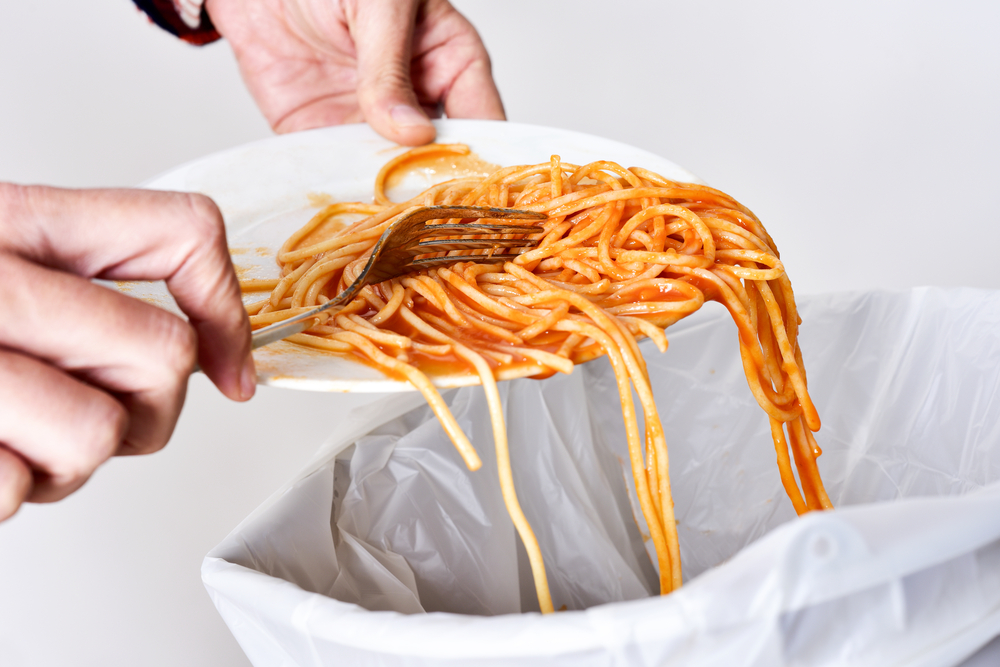Food for Thought: Americans Just Can't Stop Throwing Out Food

Food waste is piling up in America, and although the vast majority of Americans feel bad about throwing out food, most of us also think it would be hard to reduce the amount of food we throw away, a new survey finds.
The survey of 500 people in the U.S. found that 77 percent of respondents said they felt guilty about throwing away food. But 51 percent said they thought it would be difficult to reduce their food waste.
Americans toss out around 80 billion lbs. of foods each year, according to the study.
In addition to being a waste of resources, throwing away food has a negative impact on the environment, according to the study, published today (July 21) in the journal PLOS ONE. Indeed, food waste is the largest source of solid waste in the U.S., accounting for 35.2 million tons of solid waste, the researchers wrote. [6 Ways to Feed 11 Billion People]
It is also the most significant source of greenhouse gases from solid waste, they wrote.
Interestingly, the researchers also found that most of the people in the survey — 87 percent — thought that they wasted less food than others. People think that "it's somebody else that's creating food waste," Brian Roe, a co-author of the study and a professor of agricultural, environmental and development economics at The Ohio State University, said in a statement.
The researchers conducted their survey because, despite the problems surrounding food waste, little has been done to understand why Americans throw out so much food, they said.
Sign up for the Live Science daily newsletter now
Get the world’s most fascinating discoveries delivered straight to your inbox.
"Generally, we found that people consider three things regarding food waste," Danyi Qi, a doctoral student in agricultural economics at The Ohio State University and a co-author of the study, said in a statement.
One thing that people think about are the perceived practical benefits of throwing out food, such as reducing their risk of a foodborne illness, Qi said.
The researchers found, for example, that 70 percent of the respondents said that they believethrowing away food after it passes its package date helps reduce the risk of getting sick. Another perceived practical benefit is for freshness and quality: Nearly 60 percent of the respondents said that "some food waste is necessary" to keep meals fresh and flavorful.
But people also have feelings of guilt about throwing away food, Qi said. For instance, 58 percent said they understood that throwing away food was bad for the environment and 42 percent said that they thought it was a major source of wasted money, the researchers found.
Finally, when people throw out food, they think about their behavior in relation to how they manage their household, Qi said. For example, 24 percent said they don't have the time to worry about food waste. However, 53 percent of the respondents said they realized that when they bought food in bulk they ended up throwing away more of it.
The researchers offered insights into how Americans can reduce their food waste.
A majority of people in the survey said that they throw away food after it passes the "sell-by" or "use-by" date on the package. Removing these dates could significantly reduce food waste, the researchers said.
"Only in rare circumstances is that date about food safety, but people are confused about the array of dates on food packages," Roe said. In other words, the package date on foods does not mean that the food will become unsafe to eat after that date.
The researchers noted that awareness about food waste has actually gone up in the past year. Awareness is about 10 percent higher than it was in a previous study, Roe said. But it's still very low, he added.
Increasing awareness "wouldn't be a silver bullet" to reduce food waste, Roe said. But it could sway some people to change their behaviors, he said. Giving people a way to measure the food waste in their household could therefore lead to improvement, the researchers said.
Originally published on Live Science.










